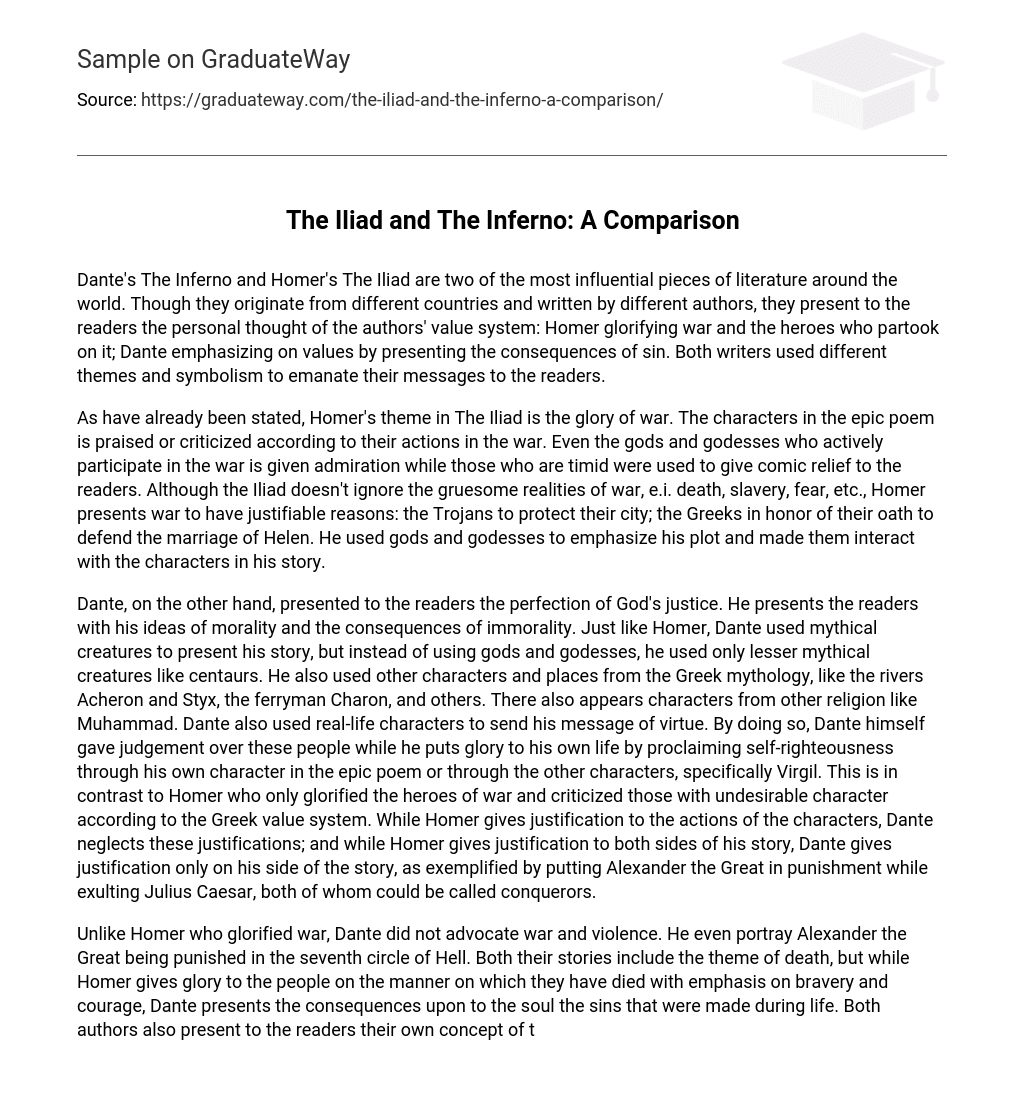Dante’s The Inferno and Homer’s The Iliad are two of the most influential pieces of literature around the world. Though they originate from different countries and written by different authors, they present to the readers the personal thought of the authors’ value system: Homer glorifying war and the heroes who partook on it; Dante emphasizing on values by presenting the consequences of sin. Both writers used different themes and symbolism to emanate their messages to the readers.
As have already been stated, Homer’s theme in The Iliad is the glory of war. The characters in the epic poem is praised or criticized according to their actions in the war. Even the gods and godesses who actively participate in the war is given admiration while those who are timid were used to give comic relief to the readers. Although the Iliad doesn’t ignore the gruesome realities of war, e.i. death, slavery, fear, etc., Homer presents war to have justifiable reasons: the Trojans to protect their city; the Greeks in honor of their oath to defend the marriage of Helen. He used gods and godesses to emphasize his plot and made them interact with the characters in his story.
Dante, on the other hand, presented to the readers the perfection of God’s justice. He presents the readers with his ideas of morality and the consequences of immorality. Just like Homer, Dante used mythical creatures to present his story, but instead of using gods and godesses, he used only lesser mythical creatures like centaurs. He also used other characters and places from the Greek mythology, like the rivers Acheron and Styx, the ferryman Charon, and others. There also appears characters from other religion like Muhammad. Dante also used real-life characters to send his message of virtue. By doing so, Dante himself gave judgement over these people while he puts glory to his own life by proclaiming self-righteousness through his own character in the epic poem or through the other characters, specifically Virgil. This is in contrast to Homer who only glorified the heroes of war and criticized those with undesirable character according to the Greek value system. While Homer gives justification to the actions of the characters, Dante neglects these justifications; and while Homer gives justification to both sides of his story, Dante gives justification only on his side of the story, as exemplified by putting Alexander the Great in punishment while exulting Julius Caesar, both of whom could be called conquerors.
Unlike Homer who glorified war, Dante did not advocate war and violence. He even portray Alexander the Great being punished in the seventh circle of Hell. Both their stories include the theme of death, but while Homer gives glory to the people on the manner on which they have died with emphasis on bravery and courage, Dante presents the consequences upon to the soul the sins that were made during life. Both authors also present to the readers their own concept of the underworld. It can also be noted that Dante’s Inferno could be based on the Greek concept of the underworld with some differences. For the Greeks and for Homer, all souls go into the underworld upon death while Dante’s Inferno only holds unrepentant sinners. Although both authors recognize the impermanence of life on earth, they also present the readers on achieving immortality: Homer through the glory of war; Dante through literature. Indeed, the heroes in The Iliad like Achilles and Hector (and others) were immortalized by Homer and at the same time Homer, and also Dante, were immortalized through their writings. The main difference that could be seen in Homer’s presentation of immortality with Dante’s is that while Homer only immortalizes the characters found in his epic poem, Dante presented immortality as could be achieved both by those encompassed in the poet’s story and the poet himself. Dante also puts himself with much glory in coparison with other characters in his epic poem.
References
Alighieri, Dante. The divine comedy: The Inferno. Translated by Henry Wadsworth Longfellow.





